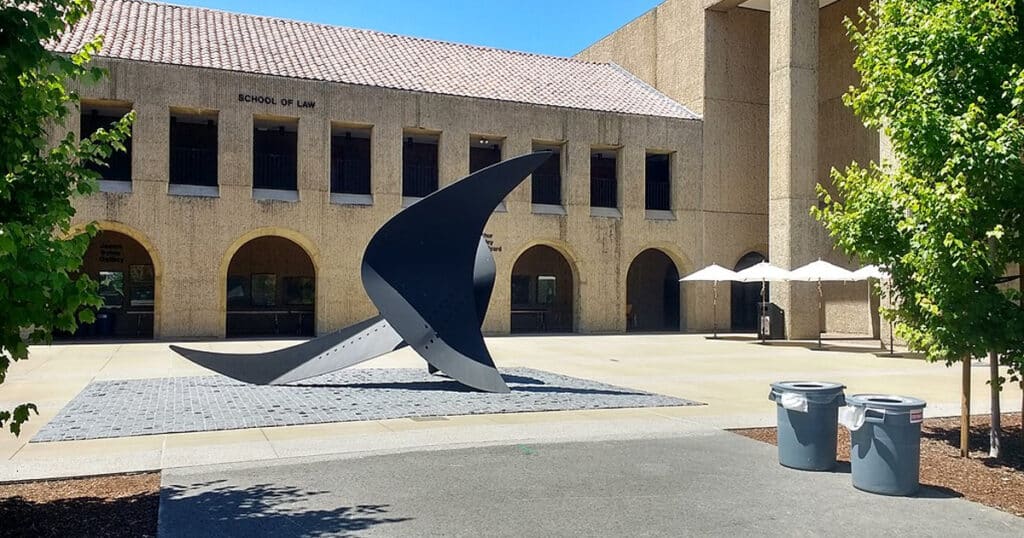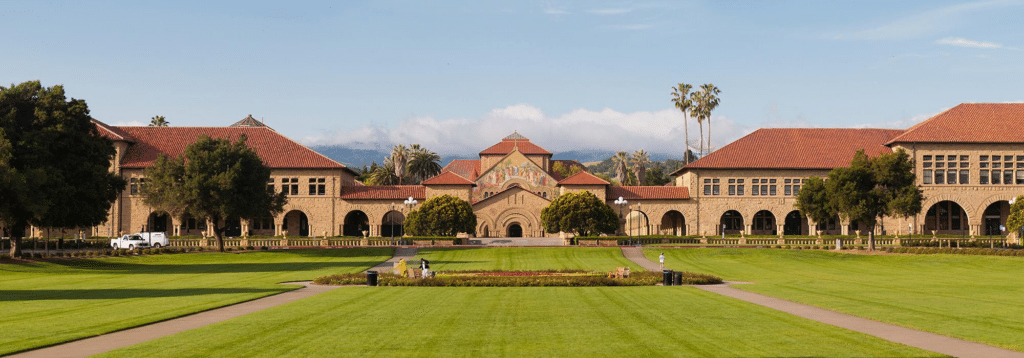
That Tantrum at Stanford Law School and What to Do About It
Another day, another tantrum at one of the nation’s top law schools. On Thursday, law students at Stanford (the No. 2 law school in the country) followed the example set by their peers at Yale (No. 1) by shouting down U.S. Circuit Court Judge Kyle Duncan, preventing him from delivering a lecture to other students who had invited him.
Student members of The Federalist Society invited Duncan, who sits on the 5th U.S. Circuit Court of Appeals, to talk about how the decisions of his court have affected Supreme Court decisions. He didn’t get the chance.
When liberal students heard that Duncan would speak on campus, they expressed their “upset and outrage” to Tirien Steinbach, the law school’s associate dean for diversity, equity, and inclusion, who shared their feelings.
In an email, Steinbach wrote that Duncan “repeatedly and proudly threatened healthcare and basic rights for marginalized communities, including LGBTQ+ people, Native Americans, immigrants, prisoners, Black voters, and women.”
This isn’t true, but an undeterred Steinbach said that “his presence on campus represents a significant hit to [students’] sense of belonging.”
Steinbach said Stanford Law School supports the right of students to protest the event, but she promised that the school would not “censor Judge Duncan’s [sic], nor the students’ [sic] hosting him, nor stifle free speech by canceling this engagement.”
Before the event started, about 100 protesters jeered at 20 or so members of The Federalist Society as they entered the room. Inside, 50 to 70 protesters shouted insults and vulgarities at Duncan. (Many jeers were too vulgar to print, but you can read some here).
This continued for 20 to 30 minutes as the judge tried in vain to deliver his remarks.
‘What Does That Mean?’
Although the law school maintains a free speech policy that prohibits faculty, staff, and students from preventing or disrupting guest lectures, none of the five administrators present—including Steinbach; Jeanne Merino, acting associate dean of students; Megan Brown, student affairs program coordinator; and Holly Parrish, associate director of student affairs—intervened to enforce the policy.
To the contrary, when Duncan asked the administrators to do so, Steinbach took the microphone, opened a folio, and began reading from prepared remarks. For about six minutes, she excoriated the judge as protesters snapped their fingers and hollered in support.
The federal judge’s presence on campus, Steinbach said, was “tearing at the fabric of this community.” She accused him of taking away students’ rights, causing harm, and uttering speech that “literally denies the humanity of people.”
The protesters, she claimed, “are here to learn” but expect guests to “come with good intentions and respect.” She thanked the judge for “protecting the free speech that we value here” but asked several times: “Is the juice worth the squeeze?” (You can read a transcript of Steinbach’s full remarks here, and watch the video here).
“What does that mean?” Duncan asked.
Steinbach replied that she was asking whether his presence and speech on campus is worth the “pain” and “division” that it causes. Perhaps, she suggested, the school should “reconsider” its free speech policy.
To Duncan, the event felt like “a setup.” Afterward, he likened it to a “therapy session from hell.”
Giving up on his remarks, Duncan said he would answer students’ questions. The students took the gesture as an invitation to hurl more insults at him.
Fed up, Duncan chastised them, saying: “You are all law students. You are supposed to have reasoned debate and hear the other side, not yell at those who disagree.”
In response, one student yelled: “You don’t believe that we have a right to exist, so we don’t believe you have the right to respect or to speak here!”
‘Grotesquely Unfair’
It seems that the protesters targeted Duncan because they perceive the judge as being hostile to progressive social causes.
In an email to its members at Stanford Law, the National Lawyers Guild—a left-wing group that helped to organize the protest—wrote: “Duncan’s record, jurisprudence, views, and personal conduct are beyond ‘disrespectful’: they are as antithetical to the social justice mission of NLG as it is possible to be.”
To date, no protester, Stanford administrator, or defender of their actions has argued that any of Duncan’s rulings were legally wrong. Rather, according to the National Lawyers Guild, its contempt for him stems from a “strong moral commitment” to progressive politics.
As unpleasant as this was, Duncan said later that “nobody should feel sorry for me.” Instead, the judge said he felt bad and outraged for Federalist Society students who invited him.
“They’re a small group, obviously way outnumbered,” Duncan said. “They are the ones who lack power and status at Stanford Law. It’s ridiculous that they can’t get treated with civility, and it’s grotesquely unfair.”
Incredibly, after the event, Steinbach told members of Stanford’s Federalist Society that protesters complied with the school’s free speech policy.
But later, Stanford President Marc Tessier-Lavigne and Stanford Law Dean Jenny Martinez apologized to Duncan, saying that “what happened was inconsistent with our policies on free speech.”
Without mentioning Steinbach by name, Tessier-Lavigne and Martinez said that “staff members who should have enforced university policies failed to do so, and instead intervened in inappropriate ways.”
The two assured the judge that they were “taking steps” to make sure such a thing doesn’t happen again. What those steps are, they didn’t say.
They also didn’t apologize to Federalist Society students, whose event was ruined by the protesters and administrators.
Stanford ‘at Its Best’?
Adding insult to injury, Merino, the acting associate dean of students, emailed Stanford Federalist Society leaders after the event “to support your safety and mental health.” She told them to reach out to therapists, any administrator from the Office of Student Affairs who was at the event, or—the kicker—Steinbach.
Merino also admonished the leaders not to talk about what happened on social media “until this news cycle winds down,” and to “consider removing your individual names from your [Stanford Law School] websites.”
One can’t help but get the feeling that Stanford is worried about upsetting a powerful federal judge and protecting its reputation, but not so concerned about creating what Steinbach would call “a culture of belonging” for its conservative, libertarian, and non-revolutionary liberal students.
As for the protesters, they’re celebrating their bad behavior as a great success. David Lat, who has interviewed current students and alumni, said the protesters are “unapologetic” and want Duncan to apologize to them.
For its part, the National Lawyers Guild said the student protesters “represented Stanford Law School at its best.”
That’s no mere bluster in the face of criticism; they sincerely believe it. Josh Blackman, an associate professor of law at the South Texas College of Law, explains that this arrogance is possible when a school’s department of diversity, equity, and inclusion, or DEI, supports students’ victim mentality:
When a university empowers DEI to deem speech ‘harmful,’ DEI will deem speech ‘harmful.’ … When a university teaches students that ‘harmful’ speech has no place on a campus, the students will take steps to prevent ‘harmful’ speech on their campus. This protest was a direct byproduct of what students have learned for years.
How to Respond
The last time a top law school (Yale) joined its radical students to stifle the free speech rights of other students and their guests, two prominent federal judges announced that they would not hire law clerks from the school (starting a few years from now so as to spare currently enrolled students).
That was deeply embarrassing for Yale’s law school, because placing students in clerkships is a major mark of a school’s success and prestige. As a result, Yale all but groveled for the judges’ forgiveness and committed to stronger free speech protections.
We’ll see if it lasts, but it’s a change for the better.
It also underscores that the only way to stop this problem is through appropriate punishment. Lessons about why free speech and rational debate are important to the practice of law will not work; these students are swept up in what they believe is a moral crusade.
Here are some more promising options:
First, Stanford should punish the students who protested and the administrators who did nothing. Duncan has called for Steinbach to be fired; she should be. It isn’t enough for Stanford’s president to rebuke unnamed “staff members” for failing to enforce the free speech policy. A few pink slips, on the other hand, might encourage those who remain to behave.
Add to that more clerkship boycotts by federal judges. Law schools must be forced to specify the steps they’re taking to correct these incidents and to prove that they’re working. If two judges forced Yale to do that, a few more could improve the rest of the top schools.
In the meantime, the students of the Stanford Federalist Society should consider filing complaints with state bar examiners about the moral character of the protesters. Duncan is right: Lawyers can’t be both good at their jobs and closed-minded zealots.
Finally, hiring managers at law firms should not hire any of those involved in such protests. Because many of the largest law firms and their larger clients are quite liberal, a hiring manager probably can’t speak out publicly against radical students. But quiet rejection is an option.
The names and pictures of many of the protesters have been reported. A quiet veto here, a tossed resume there—and some would-be protesters might catch on. Meantime, law firms will be spared from hiring new lawyers who lack the temperament and character to do the job well.
It’s time for rational people to stop pretending that the rules of polite society require them to tolerate this nonsense.



